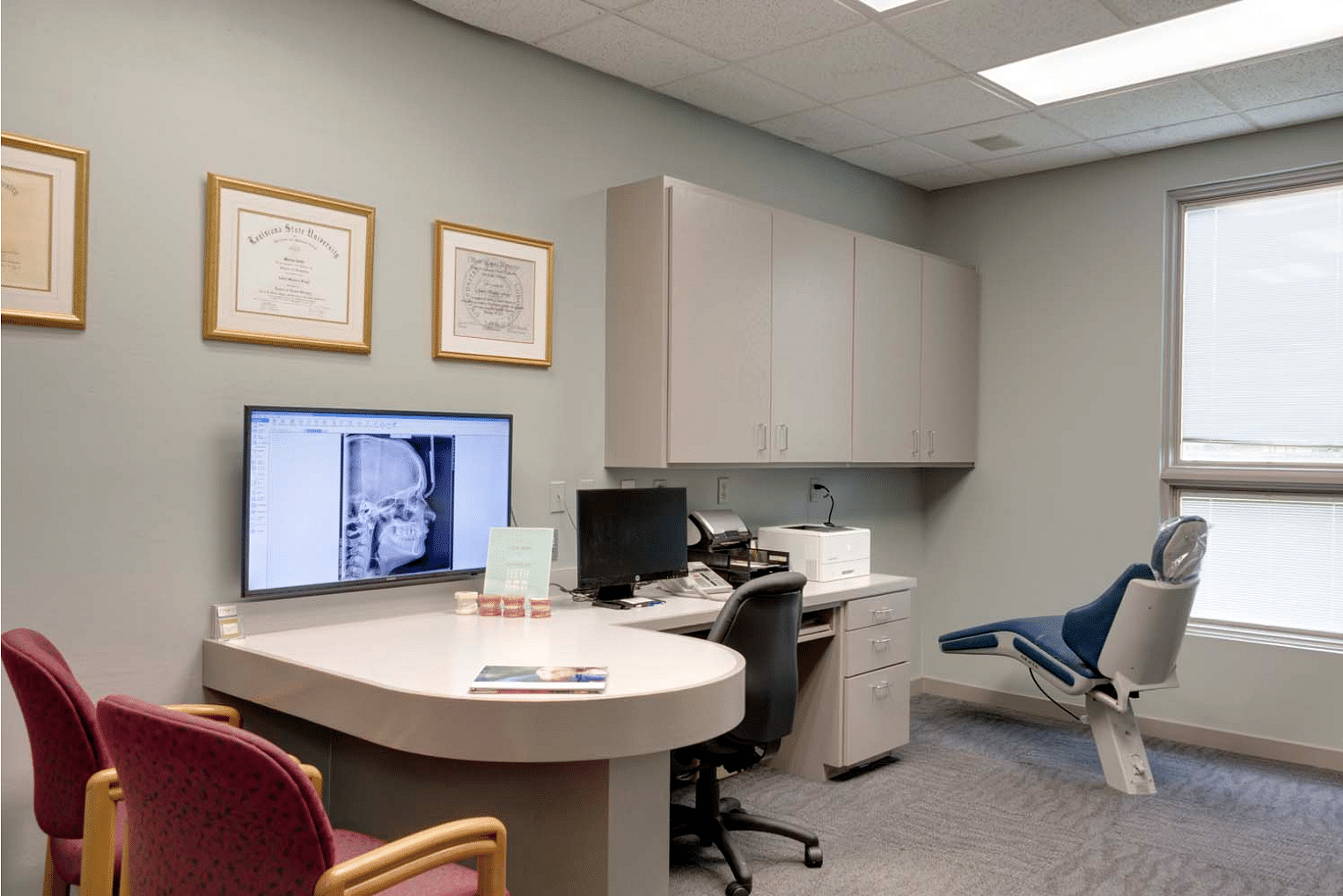For appointments, call (225) 292-6991. Serving Baton Rouge, Gonzales, Denham Springs, and New Roads
TMJ Treatment in Baton Rouge
TMJ Orthodontic Treatment
TMJ is short for temporomandibular joint pain. This is a joint near your ear that acts as a hinge to connect your skull and jawbone. Each side of your jaw has a joint that can cause pain and pain in the muscles surrounding it. TMJ treatment in Baton Rouge is common in those experiencing pain around their jaw in everyday life.

Holistic TMJ Treatment in Baton Rouge
Since TMJ can have impacts on more than just your jaw, it’s important to select a TMJ orthodontist who will understand how to treat your body in a well-rounded manner.
Treatments should be addressed in relationship with the TMJ joint’s functionality, surrounding muscle interference, and more. Therefore, a holistic approach to TMJ pain is generally the most successful one.
Learn More About TMJ
There are multiple treatments for TMJ in Baton Rouge and the surrounding areas that will resolve your pain for good. Pain relievers and anti-inflammatory medication for TMJ can be used to control symptoms. Oral splints or mouth guards can be used to prevent excessive grinding and clenching. Counseling is also available to help you de-stress to reduce tension in the neck and head.
Surgical procedures for TMJ patients around Baton Rouge are also possible in severe cases. These procedures can include open-joint surgery, injections, arthrocentesis, a modified condylotomy, and more. Depending on your TMJ doctor, your treatment will vary.

The precise causes of TMJ are challenging to determine. The pain you experience might be from a combination of elements such as arthritis, injury, or genetics. People who experience jaw pain tend to grind their teeth, which is scientifically known as bruxism, but many people clench their teeth habitually and do not develop TMJ.
There are also concerns that TMJ is caused by misaligned joints, damage to the cartilage, and multiple impacts to the area.
Your doctor will review your symptom history with you while examining your mouth and jaw. They will press on areas around the jaw joints to see how you will respond and if you feel pain, investigate any sounds your jaw makes when you open and close your mouth, and check the range of motion of your jaw. They might also order an x-ray, MRI, or other diagnostic tests to check the severity of any possible TMJ. It’s important for those looking for TMJ treatment in Baton Rouge to utilize a doctor with skill and care with something so delicate and life-changing.
The symptoms and signs of TMJ are easy to spot and may include:
- Facial pains
- Locking and clicking in the area of your jaw joints
- Pain when chewing
- Aching feelings around the ear
- Tenderness of the jaw
- Pain in your temporomandibular joint
When most people hear the word “orthodontics,” they think about straightening malaligned teeth and usually little else. However, what is commonly misunderstood is that there are two styles of orthodontics: traditional orthodontics and TMJ orthodontics. Although both types are meant to address your teeth and the surrounding areas of your mouth, TMJ orthodontics is more specialized.
If your teeth need to be straightened, you would obviously be able to start the process of realigning them with the help of most orthodontists. However, if you have pain from TMJ, then going to whoever comes up first in the phonebook could actually do more damage in the long run and make your pain worse!
Besides the name, there are some significant differences between traditional and TMJ orthodontics:
- Bite Pattern — TMJ orthodontics tackles addressing the patient’s bite differently than traditional methods. While they might appear similar at first, there are two fundamental differences. Traditional orthodontics will primarily concentrate on aligning the teeth under the idea that the habitual bite is the most functional bite possible. They will use braces, spacers, and retainers to make sure that this bite pattern is achieved and maintained.
In contrast, TMJ orthodontists reject the idea that the habitual bite is universally superior in the case of a patient with TMJ pain. What they seek to do instead is determine the ideal relationship of each jaw joint and muscle as part of a larger functioning picture. This is done because poor jaw alignment itself is typically the cause of most TMJ disorders.
If you’re enduring TMJ pain, it’s paramount that you see an orthodontist who will know how to address the root causes of your problem. - Muscle and Jaw Relationship — Your jaw contains the area around your temporomandibular joint as well. This is the joint that is abbreviated to TMJ for short and is usually the source of pain.
Traditional orthodontics will focus on expanding your mouth, if necessary, before slapping on a set of braces to begin straightening your teeth. However, TMJ orthodontists will investigate the cause-and-effect relationship that results in you experiencing pain. Because a dysfunctional jaw has a knock-on effect, it impacts how the rest of your mouth will perform in the long run. Therefore, focusing only on the teeth will not be enough to resolve most cases of TMJ pain.
Having a balanced relationship between muscles, joints, upper quadrants of the jaw, and your overall bite is crucial to resolving TMJ issues.
- Bite Pattern — TMJ orthodontics tackles addressing the patient’s bite differently than traditional methods. While they might appear similar at first, there are two fundamental differences. Traditional orthodontics will primarily concentrate on aligning the teeth under the idea that the habitual bite is the most functional bite possible. They will use braces, spacers, and retainers to make sure that this bite pattern is achieved and maintained.
When getting ready for your doctor’s appointment, there is a list of TMJ questions that may benefit you to know beforehand:
- What supplements and medications do you take on a regular basis?
- Has your stress level gone up recently?
- Have you ever had TMJ symptoms in the past?
- When did your TMJ symptoms begin?
- Do you have a history of neck aches, headaches, and toothaches?
Our Patients Love Us!

Book Your Complimentary Consultation Today!
We’ll answer all of your questions, provide a personalized treatment plan, and work with your insurance and finances to find a solution that works for you. Ready to schedule your complimentary consultation with our orthodontists? Request a callback and we’ll reach out at a time that works best for you.
We're Active in the Community







Follow Us On Social